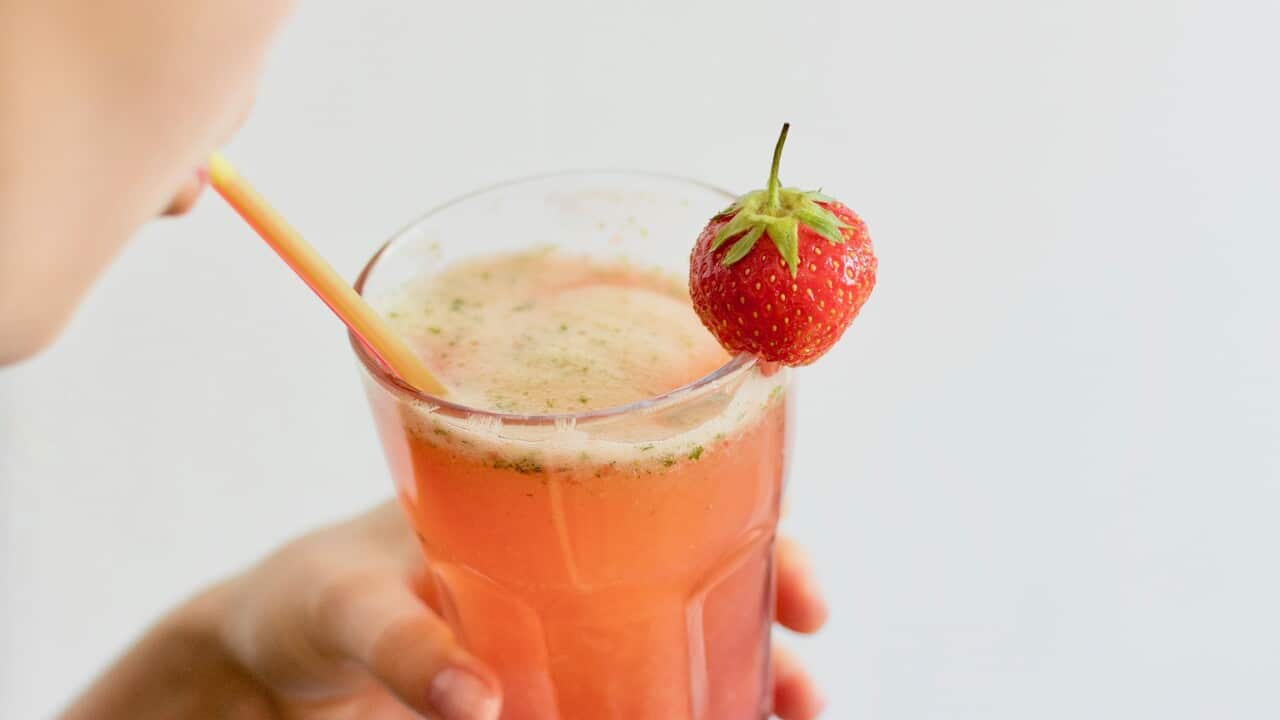While we’re busy fighting the obesity war on a sugar front, paying particular attention to soft drinks, we might be missing the battle that should take place over 100 per cent natural fruit juices and smoothies.
As viewers learn in episode two of Hugh’s Fat Fight airing on SBS on Monday 24 September at 8.30pm, the popularity of ‘no added sugar’ fruit juices and smoothies around the world is contributing to the global obesity epidemic.
UK-based nutritionist and anti-sugar campaigner, Kawther Hashem, clarifies that the problem is not fruit - fruit and vegetables are good for you. The issue is that smoothies and juices are often being mislabelled and wrongly marketed as ‘health drinks’ when they actually contain a lot of sugar.
“What’s left in a smoothie is also a higher concentration of sugar than you would naturally intake if you just ate whole fruit,” Hashem tells the show's host and celebrity chef, Hugh Fearnley-Whittingstall.
“It's not just the whole apple and the orange in a [fruit juice or smoothie] bottle. You’ve essentially stripped out all the sugars and the liquid from the fruit, leaving behind some benefit, which is the fibre from the fruit. So you’ll have some benefits [from making fruit into a juice or smoothie] but you have to drink a very small amount of it.
"This is why we need to focus on the portion sizes when it comes to fruit juices.”
What’s left in a smoothie is also a higher concentration of sugar than you would naturally intake if you just ate whole fruit.
The portion sizes of store-bought juices and fresh smoothies vary but they look tiny enough: a 250-millilitres bottle of juice is around half the size of a standard water bottle.
Even still, Hashem says 250-millilitre is too much juice to have in one day as it exceeds the amount contained in a single fruit serve.
“One of your five [serves of fruit and vegetables] a day is only 150-millilitres. It’s supposed to be the juice that is in a portion of fruit. It’s not supposed to be the equivalent of four or five apples.
“So essentially, what ends up happening is you’ve taken more sugar because you have the equivalent of more fruits in that single bottle.”
Hashem explains the perfect size of a smoothie bottle, to ensure we are not consuming too much sugar, is around 150-millilitres.
To find out whether most people in the UK truly comprehend the content of ‘healthy’ small store-bought fruit smoothies, Fearnley-Whittingstall quizzes people on the street on the sugar content of popular soft drinks versus smoothies and pure juices.
It’s revealed that a can of Coke and one brand of orange juice of a similar size both contain over around 8.5 teaspoons of sugar. The energy drink used in the show has about 6.5 teaspoons while the smoothie contained 7.5 teaspoons.
The adults should not have more than six teaspoons of free sugars per day.
“I’m challenging all the major juice brands to stop putting misleading portion sizes on their bottles,” Fearnley-Whittingstall says on the show, reminding viewers that Innocent smoothies is owned by Coca-Cola and
, published in BMJ Open in 2016, also confirms that natural fruit juices and smoothies contain “unacceptably high” levels of sugar, with smoothies among the worst offenders.
Meanwhile, released this month, has also found that juices sold in Australia may be labeled as healthy when they are actually very high in sugar.
The study, recommending that system be changed and improved, shows that more than 85 per cent of the drinks analysed awarded five out of five stars – denoting a perfect health score –were fruit juices.
PhD student Aimee Brownbill, who led the research, says this is despite the fact that we know juices and smoothies are “high or very high in sugar content, often containing more than the recommended daily intake in one 500ml bottle”.
I’m challenging all the major juice brands to stop putting misleading portion sizes on their bottles.
Brownbill added that Australia's star system for rating non-dairy drinks is currently being used more as a marketing tool for drink producers than an information tool for shoppers.
“We propose changing the method for calculating ratings so that products aren’t scored higher for having high sugar juice,” says Brownbill.
“Really, water should be the only drink that earns a five-star rating.”
The new three-part series, Hugh's Fat Fight, starts on SBS on Monday 17 September at 8.30pm and will air on Mondays at the same time thereafter. Episodes will be available to stream on after broadcast.
Follow the conversation on social media: #SBSAustralia





